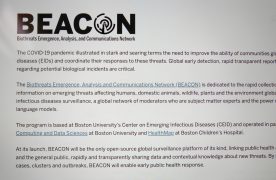Often in a terminally ill patient’s life, there comes a point when death is no longer scary. Accepting death becomes an aspect of accepting the future. As natural as taking another breath may be for a young person, death could occur naturally and quickly. Unfortunately, a massive amount of suffering often accompanies this acceptance.
Dr. Roger Kligler, a physician who lives south of Boston, has come to terms with this acceptance. Suffering from the late stages of metastatic prostate cancer, Kligler filed a lawsuit this week, petitioning for expanded end-of-life options, according to a Boston Globe article. He asserts that “he has a constitutional right to obtain a lethal dose of medication from his doctor and choose when he dies to avoid needless suffering,” according to the article.
Kligler has joined forces with physician Dr. Alan Steinbach, who is also a plaintiff in the lawsuit, who wants “the option to provide such medication to patients with terminal illnesses like Kligler.”
The debate of physician-assisted suicide, which is what Kligler is essentially advocating for, has been long-fought. According to Death with Dignity, a campaign group focused on advocating for expanded end-of-life options, Massachusetts voted on a ballot initiative in 2012 after losing 51 to 49 percent. The site explained, “Because of the Commonwealth’s rules on the initiative process, a Death with Dignity bill cannot return to the Massachusetts ballot until 2018.”
This is not a new debate to Massachusetts, but it deserves to be re-examined.
It needs to be acknowledged that physicians are human beings first. While perhaps more aware of life and death because of a constant, immediate proximity to both, physicians are still emotional beings. They can be as affected by a patient’s decision to end his or her life as the family. However, as Steinbach proves, there are physicians willing to put a patient’s wishes first and foremost.
It’s necessary for physicians to be involved in the process of end-of-life options because physicians put patients and families at ease. Physicians answer the questions that no one else can, and for this, they are invaluable.
Physicians are also necessary for executing a formulaic procedure. Without a uniform, regulated procedure, expanded options for willing patients cannot become a reality. Unfortunately, there are too many loopholes to be taken advantage of when it comes to death.
One of the strict stipulations when considering procedure should be a patient’s mental health. If an individual is diagnosed with extensive and inoperable lung cancer, for which there is no foreseeable cure, he or she should have the option to die with dignity. However, that option should only be viable if he or she is of sound mind, yet another reason to closely involve physicians in the process.
Certainly, if someone is fully experiencing all characteristics of dementia, he or she should not be permitted to make such a decision. However, if that person has been diagnosed with dementia and is anticipating the impending symptoms, that person deserves options.
An option to laugh and share stories. An option to hug grandchildren a few last times. An option to say goodbye with grace and dignity.
Choosing to end a life could be viewed as selfish. Selfish for the patient to give up, or selfish for the family to ask that person to carry on living. There are two sides to the argument, but then again, there always will be. Having the option is what matters, at least allowing those arguments to occur.
The verbiage of “committing suicide” does not fit Kligler’s act. “Commit” has such a negative connotation, associated with wrongdoing, while choosing to die with dignity is not at all wrong.
Choosing to end a life is a brave decision, but it is ultimately the decision of the patient. Kligler is choosing to end his life vocally so others can do so privately, and this sacrifice is not to be taken lightly.














Scam scam scam: the promoters of non voluntary euthanasia pitched a spontaneously created term “aid-in-dying” and asked the court if it was contrary to the law. Here is the article result:
“….we find no indication in Montana law that physician aid in dying provided to terminally ill, mentally capable adult patients is against public policy.”
Of course it is not in our law they just invented the so called value neutral term.
That assisted suicide is a homicide in Montana was confirmed so in the same case. No one (medical or family) has immunity and the falsification of the death certificate is not allowed like OR, WA and CA.
The State of Connecticut Department of Criminal Justice wrote a letter to the committee objecting that the falsification of the death certificate (like in CO Prop 106) would have “unintended and very unwelcome consequences.”
The false advertising that promotes euthanasia tramples individual choices.
For example how many times have you nodded your head when the proponents declared that the lethal dose must be self-administered? Well read the language of the law/bill and you will find that there is no means provided to insure that scam point.
That omission effectively eviscerates all of the so called safeguards. The difference between having a witness to “self administration” and no witness is that one honors individual choices and the other allows non voluntary euthanasia. A promoter was once asked “why don’t you just legalize euthanasia?” He said “the public is not ready to accept euthanasia.”